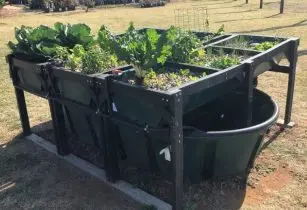A largescale aquaponics unit has been launched in Paterson to provide nutritious vegetables, as part of The Rhisotope initiative
Aquaponics is cooperation between plants and fish and the term originates from the two words aquaculture (the growing of fish in a closed environment) and hydroponics (the growing of plants usually in a soil-less environment). The event plays a vital role in raising awareness of the Rhisotope initiave among local communities.
The founding sponsor of the Rhisotope project, Rosatom launched the aquaponics unit, as well as the education programme in the Eastern Cape. The Aquaponic system was installed by leading aquaponic specialists La Pieus Aqua (LPA). The local company is renowned for installing systems at schools, community projects and sites around Africa. The CEO of LPA is an 18-year-old ecology activist Rikalize Reinecke, who started her own aquaculture and aquaponics farm in 2014.
“Aquaponics is the most innovative farming method of the new century. This system gives you the opportunity to process food in your backyard and generate an income. One system can feed a family of four to six people sustainably,” said Reinecke.
Today the aquaponics unit is run by local volunteers together with The Amakhala Foundation, which recently won the Rhodes University Community Engagement Partner of the Year Award. The produce will support families of local volunteers and provide local orphanage with nutritious vegetables. The first harvest has already been collected and sold to the nearest Safari Lodge.
Rosatom Central and Southern Africa, a regional office of the Russian state energy corporation, is the key partner of the project. Its CEO, Ryan Collyer, is confident that this aquaponic unit is going to make a difference in the daily lives of this community. Collyer added that the development of aquaponics is key to food security in the long term. "The aquaponics principle is based on the concept of sustainable development and environmental responsibility, which is directly in line with Rosatom’s core value," he added.
A special video was created to show how the aquaponics work and share the community programme with the audience. The video can be found on social media of partner organisations or via link on YouTube: https://bit.ly/3cPscBB
The Rhisotope Project is an initiative between WITS University, top global nuclear scientists, researchers, South African rhino owners and the best wildlife veterinarians in the world to significantly reduce rhino poaching. In short, by placing radioactive material in rhino’s horn, we create an effective demand reduction and rhino protection tool. It is giant leap forward in the protection of this endangered species. If the appetite for horn lowers so will poaching, the two challenges are not mutually exclusive and are inextricably linked.
The purpose of the project is to create a lasting and effective means of significantly lowering the amount of rhino being poached and killed for their horns. These animals need us more than you know. Through this, Rhino Project will provide an effective tool in the toolkit of rhino protection, innovation and the ability to evolve as the landscape changes is key.
With the international nuclear and radiological expertise brought by Rosatom to this project, it will make a significant contribution to saving and protecting rhino by reducing the desire for rhino horn, by both poachers and the end user, through the effective use of radioactive technologies currently available.




